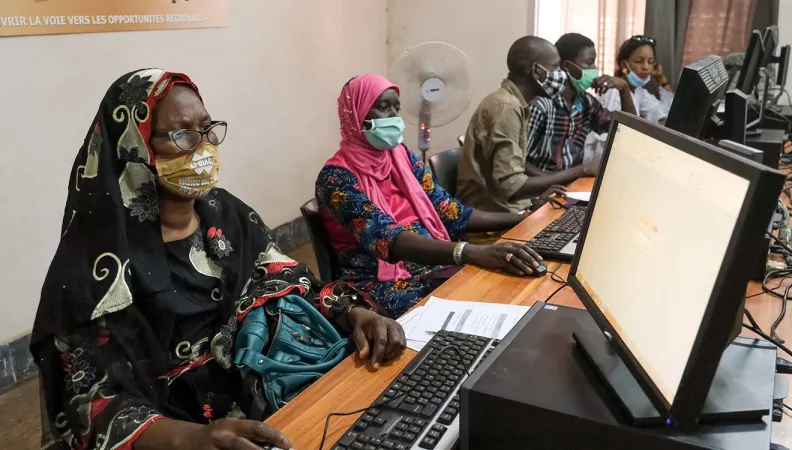Share the page
A Digital Response to the Health Crisis
Published on

Launched in Dakar, the DIRECCT program is supporting the connectivity and digitization of operators in the health, education and small business sectors. It’s a program that is helping people and policy makers cope with current and future crises in Africa, the Caribbean and Pacific.
Since the outbreak of the Covid-19 pandemic, digital services have been providing solutions to prevent a breakdown in personal, economic and social ties. Aware of the importance of digital technologies in tackling crises, the Organization of African, Caribbean and Pacific States (OACPS) and European Union (EU) have developed the Digital Response Connecting Citizens (DIRECCT) program.
Launched in Senegal’s capital on 16 November, it concerns over 55 countries in the ACP region. “In recent years, access to digital networks and tools has grown by leaps and bounds in most African, Caribbean and Pacific countries. However, we still have some distance to go to ensure that digital tools are accessible to all and help people cope with crises,” says Gwenael Prié, the program manager for AFD, which is implementing this program with the Belgian development agency (ENABEL).
DIRECCT is contributing to this effort by developing about a dozen projects in sectors that have been hard hit, more specifically the health, education and economic sectors. The crisis will have a lasting impact on these three sectors which are pillars of development and the well-being of people.
Digital services to support health
In the health sector, DIRECCT is supporting the regional epidemiological institutions of the Caribbean Community (CARPHA) and Pacific Community (ROSSP). For these two organizations, which both operate in over 20 countries, DIRECCT is helping set up digital health data collection systems, which allow for the centralizing and analysis of data provided by the members.
Further reading: our series on shared innovation
In Senegal, ENABEL and the NGO Oxfam are working on the digitization of health centers. One of the projects involves increasing access to networks, training staff and deploying digital solutions such as the “patient record”.
The program is also supporting West African FabLabs. During the crisis, young Africans are working in these digital manufacturing workshops to produce visors and handwashing facilities. With DIRECCT, they will continue to offer their innovations to health operators in their country.
Developing distance higher education
The Covid-19 crisis has in many places forced the closure of schools, causing students to miss months of lessons. Digital services allow students to maintain links to their schooling, even when it’s no longer to attend in person. Such services are increasingly available in West Africa, where connectivity work is being carried out by the French National Research Institute for Sustainable Development (IRD) and WACREN network. Two universities, in Benin and Burkina Faso, will be supported in improving the Internet connections of their campuses and developing online education courses.
Further reading: Education and Training: Our Action
The objective is to share lessons learned from these pilot projects with the academic community and West African authorities. At the same time, ENABEL is mobilizing its WeHubit innovation program to support EdTech solutions: the winners of this call for projects will be announced in a few weeks’ time.
Giving small businesses the means to work online
The health crisis has also caused an economic crisis. In this sector, DIRECCT mainly focuses on microenterprises and small and medium-sized enterprises (MSMEs). They are a key driver for the economies of many countries in the ACP region and have been weakened by the restriction on the movement of goods and products.
“In partnership with the West African Chambers of Commerce and Carib Export agency, we’re helping MSME managers get training in digital tools, which will improve the way they work and trade on line,” says Séliatou Kayode-Anglade, project manager at Expertise France. “Offline companies and the informal sector are the most affected by the difficulties caused by the pandemic: they will be our priority targets.”
Further reading: Proparco, our private sector arm
In Senegal, ENABEL is focusing on the digital transition of hundreds of SMEs in the agriculture sector and, more generally, the green economy. Another initiative of the NGO Oxfam is helping women entrepreneurs in the most remote rural areas use their phones to save and continue their activities.
European digital ambition
With €15.4 million of financing from the EU, the DIRECCT program is fully in line with the European Union’s ambition for cooperation: “It aims to accelerate digital development for inclusive growth, job creation and the fight against inequality,” says Dorota Panczyk, ENABEL’s representative in Senegal.
The activities of the DIRECCT program are based on the European, values for inclusive digital development, with two additional objectives: first, to place the user the center of the approach to ensure solutions are relevant. Second, they tackle gender inequality in access to digital opportunities. These are values shared by ENABEL and AFD, as part of their approaches to digital services and sustainable development in general.
The content of this publication is the sole responsibility of AFD and does not necessarily reflect the opinions of the European Union.
